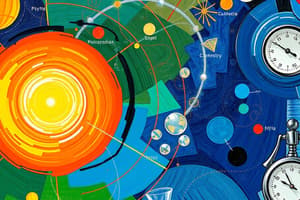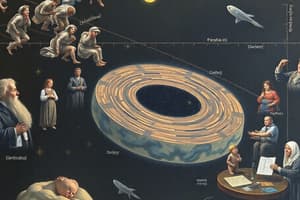Podcast
Questions and Answers
What is the primary focus of the scientific method?
What is the primary focus of the scientific method?
- To provide immediate answers to questions
- To confirm findings and prove or disprove a hypothesis (correct)
- To entertain various hypotheses without testing them
- To create theories based solely on assumptions
What does the term 'social contract' refer to?
What does the term 'social contract' refer to?
- A system of economic theories in a capitalist society
- A process for electing leaders in a democracy
- A set of laws governing property rights
- An agreement where people surrender their freedom to a powerful government (correct)
What was the significance of the Tennis Court Oath during the French Revolution?
What was the significance of the Tennis Court Oath during the French Revolution?
- It demanded the abolition of the Estates-General
- It was a pledge of loyalty to the king by the third estate
- It was a commitment by the third estate to forming a new government (correct)
- It marked the beginning of the French monarchy's power
How did the Reign of Terror change France during the Revolution?
How did the Reign of Terror change France during the Revolution?
What does 'Laissez-Faire' refer to in economic terms?
What does 'Laissez-Faire' refer to in economic terms?
What role did the Committee of Public Safety play during the French Revolution?
What role did the Committee of Public Safety play during the French Revolution?
What are 'Natural Rights' as understood in Enlightenment thought?
What are 'Natural Rights' as understood in Enlightenment thought?
What was the purpose of salons during the Enlightenment?
What was the purpose of salons during the Enlightenment?
What was the main focus of the Congress of Vienna?
What was the main focus of the Congress of Vienna?
Which philosopher is associated with the idea of separation of powers in government?
Which philosopher is associated with the idea of separation of powers in government?
Which of the following statements correctly describes Isaac Newton's contributions?
Which of the following statements correctly describes Isaac Newton's contributions?
What was the role of Marie Antoinette during the French Revolution?
What was the role of Marie Antoinette during the French Revolution?
What was the first event of the French Revolution?
What was the first event of the French Revolution?
What caused Napoleon's downfall?
What caused Napoleon's downfall?
Which two nations primarily controlled Latin America during the colonial period?
Which two nations primarily controlled Latin America during the colonial period?
In what way did the American and French Revolutions differ?
In what way did the American and French Revolutions differ?
Which event marked Napoleon's final defeat?
Which event marked Napoleon's final defeat?
What role did Simon Bolivar play in Latin America?
What role did Simon Bolivar play in Latin America?
What was a common cause of the Latin American revolutions?
What was a common cause of the Latin American revolutions?
Which statement reflects the achievements of the Scientific Revolution?
Which statement reflects the achievements of the Scientific Revolution?
Who is known as the 'Father of Mexico' for his role in the country's fight for independence?
Who is known as the 'Father of Mexico' for his role in the country's fight for independence?
Flashcards
Heliocentric Theory
Heliocentric Theory
The belief that the Sun is the center of the universe.
Scientific Method
Scientific Method
A systematic approach to exploring and testing ideas through observation, experimentation, and analysis.
Hypothesis
Hypothesis
An idea or explanation that has not yet been proven but is used as a starting point for further investigation.
Social Contract
Social Contract
Signup and view all the flashcards
Natural Rights
Natural Rights
Signup and view all the flashcards
Philosophe
Philosophe
Signup and view all the flashcards
Censorship
Censorship
Signup and view all the flashcards
Enlightened Despot
Enlightened Despot
Signup and view all the flashcards
Congress of Vienna
Congress of Vienna
Signup and view all the flashcards
Nicolaus Copernicus
Nicolaus Copernicus
Signup and view all the flashcards
Galileo Galilei
Galileo Galilei
Signup and view all the flashcards
Sir Isaac Newton
Sir Isaac Newton
Signup and view all the flashcards
Thomas Hobbes
Thomas Hobbes
Signup and view all the flashcards
John Locke
John Locke
Signup and view all the flashcards
Montesquieu
Montesquieu
Signup and view all the flashcards
Voltaire
Voltaire
Signup and view all the flashcards
Jean-Jacques Rousseau
Jean-Jacques Rousseau
Signup and view all the flashcards
Adam Smith
Adam Smith
Signup and view all the flashcards
King George III
King George III
Signup and view all the flashcards
King Louis XVI
King Louis XVI
Signup and view all the flashcards
Marie Antoinette
Marie Antoinette
Signup and view all the flashcards
Maximilien Robespierre
Maximilien Robespierre
Signup and view all the flashcards
Napoleon Bonaparte
Napoleon Bonaparte
Signup and view all the flashcards
Simon Bolivar
Simon Bolivar
Signup and view all the flashcards
Jose de San Martin
Jose de San Martin
Signup and view all the flashcards
Miguel Hidalgo
Miguel Hidalgo
Signup and view all the flashcards
Toussaint L'Ouverture
Toussaint L'Ouverture
Signup and view all the flashcards
Study Notes
Heliocentric Theory & Scientific Method
- Heliocentric theory: Sun-centered model of the universe.
- Scientific method: Systematic process for investigating and proving or disproving hypotheses. Includes steps like questioning, researching, hypothesizing, experimenting, data analysis, concluding, and communicating.
Enlightenment Thinkers & Philosophies
- Philosophe: French term for philosopher; Enlightenment thinkers who advocated for reforms.
- Social contract: Agreement where people give up freedoms for an organized government.
- Natural rights: Fundamental rights like life, liberty, and property.
- Censorship: Restrictions on ideas and information.
- Salon: Informal gatherings where Enlightenment thinkers exchanged ideas.
- Enlightened despots: Absolute rulers using their power to enact reforms inspired by the Enlightenment.
- Physiocrats: French thinkers who focused on economic reform.
- Laissez-faire: Economic policy to minimize government intervention in business.
French Revolution
- Estates: French social classes (clergy, nobility, commoners).
- Bourgeoisie: Middle class (part of the Third Estate).
- Estates-General: Legislative body representing all three estates.
- Tennis Court Oath: Oath by Third Estate representatives vowing to create a new constitution.
- Bastille: Prison in Paris stormed, marking the start of the French Revolution (1789).
- Louis XVI: King of France during the Revolution; executed.
- Marie Antoinette: Queen of France; executed.
- National Assembly: Government formed by the Third Estate.
- Sans-culottes: Working-class revolutionaries known for wearing long trousers.
- Reign of Terror: Period of violence and executions during the Revolution (1793-1794).
- Guillotine: Execution device used during the Reign of Terror.
- Committee of Public Safety: Powerful revolutionary committee; led by Robespierre during the Reign of Terror.
- Maximilien Robespierre: Leader of the Committee of Public Safety; executed.
- Napoleonic Code: System of French civil laws; influential in other countries.
- Napoleonic Wars: Conflicts between Napoleon's France and other European powers.
- Congress of Vienna: Meeting of European leaders after Napoleon to restore stability.
- Causes of the French Revolution: Unemployment, American Revolution, food shortages.
Scientific Revolution Key Figures & Laws
- Nicolaus Copernicus: Polish astronomer who proposed a sun-centered universe.
- Galileo Galilei: Italian astronomer who supported the heliocentric model.
- Isaac Newton: English physicist and mathematician known for laws of motion and universal gravitation.
- Newton's Laws of Motion:
- Inertia: Objects remain at rest or in motion unless acted on by a force.
- F = ma: Force equals mass times acceleration.
- Action-reaction: For every action, there's an equal and opposite reaction.
Scientific Revolution Inventions
- Examples of inventions are not specified and/or are not available.
Spreading Enlightenment Ideas
- Methods to spread Enlightenment ideas: Newspapers, pamphlets, and encyclopedias.
Latin American Revolutions
- Latin American regions: Mexico to South America.
- European colonial powers: Spain and Portugal.
- Colonial social divisions:
- Peninsulares (Spaniards/Portuguese born in Europe).
- Creoles (Spanish/Portuguese born in Latin America).
- Mestizos (mixed European and Indigenous).
- Mulattos (mixed European and African).
- Encomienda, Mita, Chattel Slavery: Forced labor systems that exploited labor and contributed to revolutionary movements.
- Latin American Revolution Leaders:
- Simon Bolivar: Freed northern South America.
- Jose de San Martin: Freed Chile and Peru.
- Miguel Hidalgo: Mexican independence leader.
- Toussaint Louverture: Leader of the Haitian Revolution.
- Events order: Scientific Revolution, Enlightenment, American Revolution, French Revolution, Latin American Revolutions.
Additional Information
- Napoleon Bonaparte: French military and political leader who crowned himself Emperor. His Code (legal system) and military campaigns significantly impacted Europe. His downfall came from attempting to invade Russia; leading to exile, and final defeat at Waterloo.
Studying That Suits You
Use AI to generate personalized quizzes and flashcards to suit your learning preferences.
Description
Explore the heliocentric theory and the scientific method, alongside key Enlightenment philosophies and thinkers. This quiz will challenge your understanding of fundamental concepts such as natural rights, social contracts, and more. Enhance your knowledge of how these ideas shaped modern thought.




